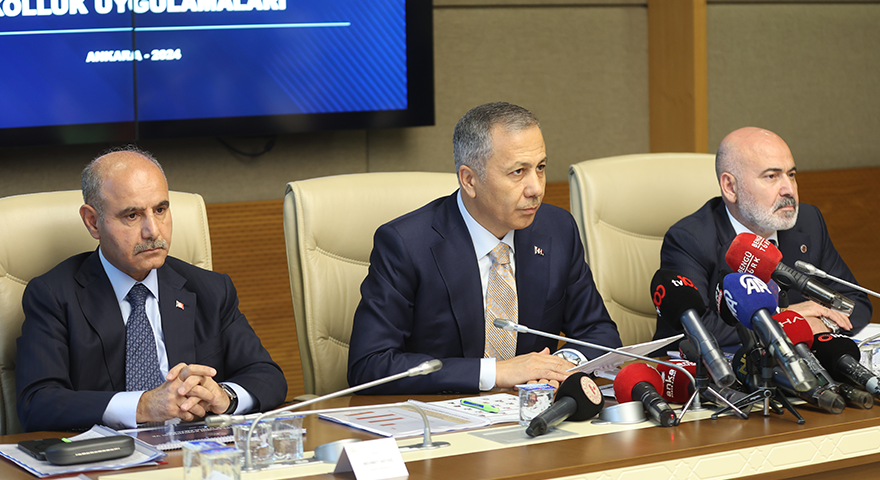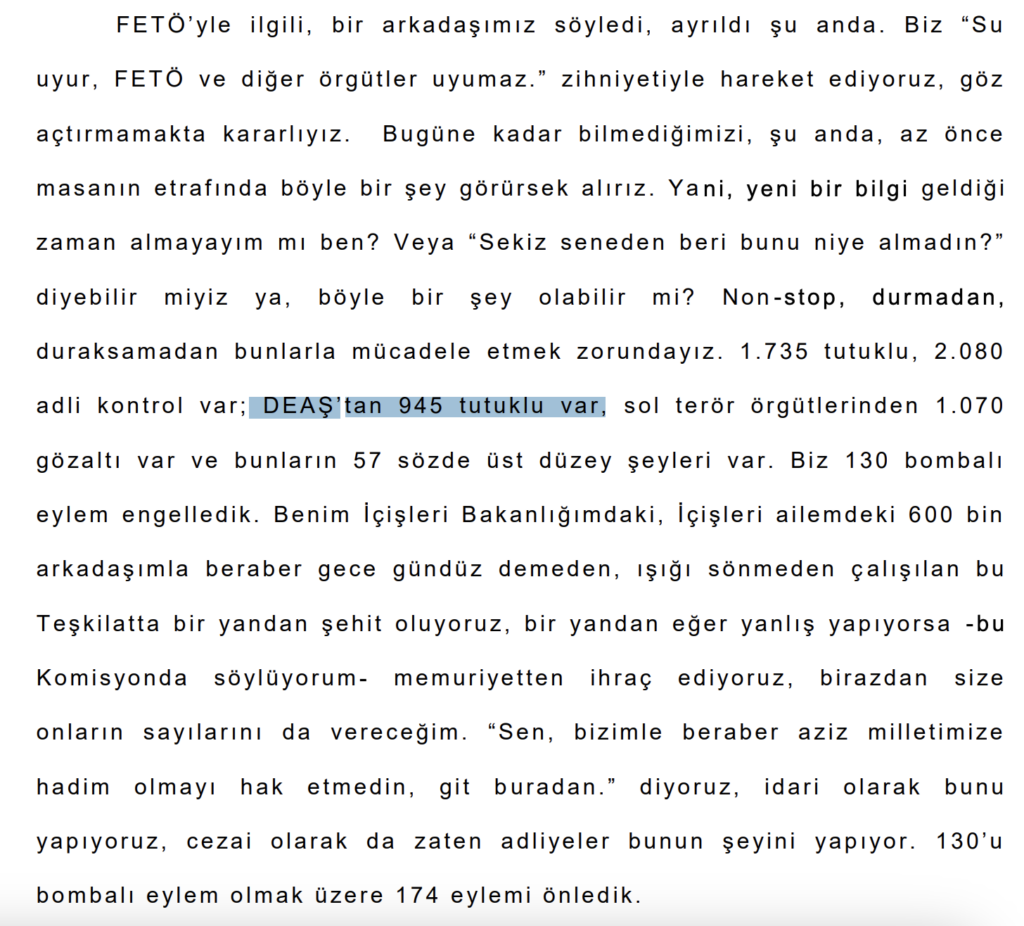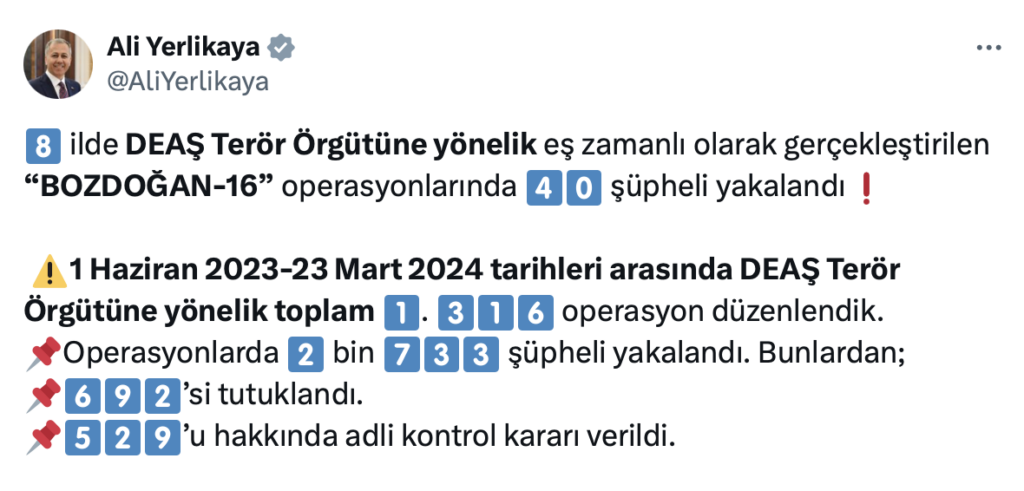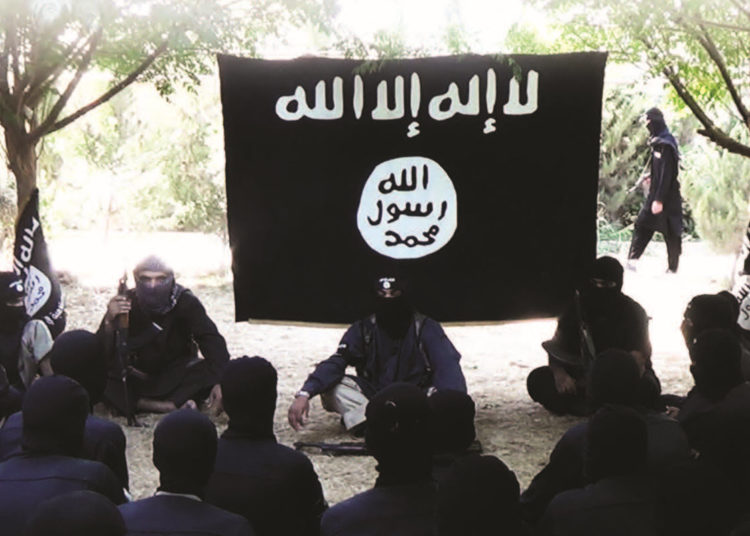Levent Kenez/Stockholm
The Turkish government persists in providing inconsistent figures regarding Islamic State in Iraq and Syria (ISIS) members held in Turkish prisons. Most recently Interior Minister Ali Yerlikaya updated the parliamentary Human Rights Committee on July 24, revealing that since he took office on June 3, 2023, operations have led to the arrest of 945 ISIS members.
However, in a statement made on March 24, Yerlikaya reported that since his swearing-in on June 3, 2023, a total of 1,316 operations targeting ISIS had been carried out, leading to the apprehension of 2,733 suspects. Of those captured, Yerlikaya said 692 had been arrested, while 529 were released under judicial supervision.

Based on this information, it can be assumed that 253 ISIS members should have been arrested within the four-month period from March to date. However, official statements from the Ministry of Interior indicate that the number of individuals detained in operations after this date falls well below this figure. Additionally, very few of those detained in ISIS operations in Turkey are actually arrested.
Eager to announce how many ISIS militants have been detained, the authorities are not so keen to reveal how many of them have been arrested. It is not known how many ISIS terrorists were actually released from detention centers and prisons because the government has never announced the figure. However, it is estimated that thousands of ISIS militants were let go after detention based on statistics provided by government officials at various times.

The criminal justice system in Turkey, under the strict control of the Islamist government, has systematically failed to jail ISIS militants. Nordic Monitor has published multiple reports based on confidential documents and whistleblower accounts showing how Turkish intelligence worked closely with ISIS and al-Qaeda militants to promote the political agenda of President Recep Tayyip Erdogan’s government as well as a secret intelligence document from Turkey’s Security Directorate General confirming that ISIS militants were released from Turkish prisons after short periods of pretrial detention.
The government aims to show a strong stance against ISIS by keeping the number of detainees high, but later it becomes obvious that very few of these individuals are actually linked to the terrorist organization.
Additionally, officials rarely disclose in their statements whether detained individuals are still in prison or if they were released shortly after arrest.
It is worth noting that the Interior Ministry, which in 2018 had published on a monthly basis the number of persons detained in counterterrorism operations on its website, stopped sharing that information as of January 1, 2019 for unknown reasons. In addition, information on how many foreigners are among the detainees and arrestees in Turkish prisons has not been updated since then.
The release of ISIS members in Turkey is also a global concern. Former interior minister Süleyman Soylu revealed in February 2023 that the government had repatriated 1,126 ISIS militants of European origin back to Europe in the last five years. Several ISIS members who have been involved in terrorist activities in Europe have somehow passed through Turkey or lived there for some time.
Nordic Monitor also published an article detailing how the Islamic State-Khorasan Province (ISIS-K) terrorist organization reportedly used Turkey for the transit of fighters, logistics, and target identification prior to an attack on the Church of Santa Maria (Meryem Ana Doğuş Kilisesi) in Istanbul’s Sarıyer district on January 28, 2024. This information is based on reports from the United Nations, the Federal Bureau of Investigation (FBI), and Turkish judicial documents.
Turkey has permitted foreign terrorist fighters (FTFs) to travel to their countries of choice or to the countries where they hold citizenship or residency rather than prosecuting them and holding them accountable for their alleged past crimes.

According to a policy approved in 2018 by President Erdogan, the Migration Management Authority (Göç İdaresi Başkanlığı), which is part of the Interior Ministry, was mandated to remove FTFs from Turkish territory, either forcibly or with their acquiescence.
The policy, still in effect today, has facilitated the movement of thousands of FTFs out of Turkey, particularly to Syria and Iraq. This has allowed them to join their jihadist counterparts in terrorist groups such as al-Qaeda and ISIS, along with their affiliate and splinter groups.
Although the government has not openly announced the details of the policy regarding FTFs, a growing body of evidence has emerged over the years, illustrating how the Erdogan administration enforces this policy.
The policy is implemented once an individual is flagged as an FTF by Turkish authorities, primarily based on classified intelligence reports. If the person has not committed any crimes in Turkey or does not face any pending administrative, financial or judicial penalties, they are put in repatriation or removal centers (Geri Gönderme Merkezi, GGM in Turkish) managed by the migration agency’s civilian personnel.
Meanwhile, Turkey continues to be a country to which individuals who have carried out terrorist activities abroad escape. Turkish authorities announced that Evgenii Serebriakov, who orchestrated a car bombing in northern Moscow on Wednesday, was apprehended in Bodrum. Turkish authorities said that at 10:30 a.m., Russian INTERPOL officials informed them that Serebriakov had arrived in Turkey on a Moscow-Bodrum flight. The Russian officials also reported that the bombing orchestrated by Serebriakov had injured two people. Serebriakov was identified as entering Bodrum Airport at 9:40 a.m., but he was not immediately recognized since he was not listed in the INTERPOL International Wanted Persons Database (e-ASF) or the national databases.
A policy of President Erdogan’s government has been to conduct large-scale operations against terrorist groups including ISIS and other jihadist organizations whenever allegations of negligence or links to Turkey emerge.
Following Serebriakov’s capture in Turkey, Yerlikaya announced that 72 suspects had been detained in the “GÜRZ-1” operations conducted against ISIS in 13 provinces on Thursday.












